Unveiling the Dynamic Personality: German Shepherd Husky Mix Temperament Explained
Hello, dog lovers today I will explain in detail about the German shepherd Husky Mix Temperament.
In this blog, we’re going to give you all the information you need about German Shepherd Husky mixes. But don’t worry, we won’t use complicated words or confusing language. We’ll explain everything in a way that’s easy to understand, so you’ll know exactly what to expect if you’re thinking about getting one of these dogs.
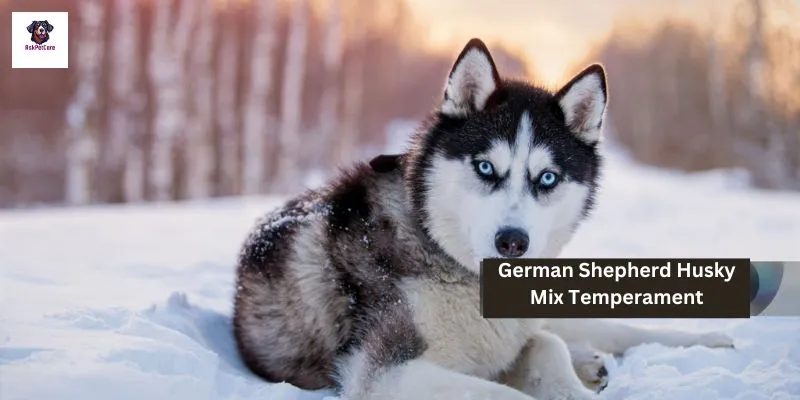
- A brief overview of German Shepherd Husky mix: German Shepherd Husky mix is a type of dog that comes from breeding a German Shepherd and a Siberian Husky together. This mix combines the traits and characteristics of both breeds, resulting in a unique and interesting dog.
- Importance of understanding temperament for potential owners: It’s really important for people who are thinking about getting a German Shepherd Husky mix to understand what their temperament is like. “Temperament” means their personality and behavior. Knowing this helps potential owners know if they can handle and care for this type of dog properly. Different dogs have different temperaments, so it’s good to know what to expect.
Firstly Understand the Origins: German shepherd Husky Mix Temperament.
- Background of German Shepherd breed: The German Shepherd breed originally comes from Germany. They were bred to be working dogs, which mean they’re really good at doing jobs like herding sheep or helping the police. German Shepherds are known for being smart, loyal, and brave. They have a strong build and are often used as police dogs or in search and rescue missions because they’re so reliable.
- Background of Siberian Husky breed: Siberian Huskies come from Siberia, which is a cold region in Russia. They were originally bred by the Chukchi people to pull sleds and help with transportation in the snow. Huskies have thick fur coats that keep them warm in cold weather, and they’re known for their endurance and ability to work hard. They’re also friendly and social dogs, often forming strong bonds with their families.
- How mixing influences temperament: When you mix a German Shepherd with a Siberian Husky, you get a dog that inherits traits from both breeds. This can lead to a variety of temperaments depending on which traits are more dominant. For example, German Shepherds are known for being protective and loyal, while Huskies are known for being friendly and energetic. So, a German Shepherd Husky mix might be protective like a German Shepherd, but also friendly and energetic like a Husky. Mixing can create a unique blend of characteristics that make each dog special.

My related articles:
black-german-shepherd-temperament-a-closer-look:
german-shepherd-lab-mix-temperament-complete-guide:
temperament-of-cane-corso-german-shepherd-mix:
Now explore Personality Traits of the German Shepherd Husky Mix :
- Intelligence and Trainability: German Shepherd Husky mixes are usually pretty smart dogs. They can learn commands and tricks quickly if they’re taught properly. Because both German Shepherds and Huskies are intelligent breeds, their mix tends to be the same. This means they’re great candidates for training, whether it’s basic obedience or more advanced tasks. However, they might also have a bit of stubbornness, so patience and consistency are key when training them.
- Loyalty and Bonding: These dogs are known for being very loyal to their families. They form strong bonds with their owners and are often protective of them. German Shepherd Husky mixes are affectionate and love spending time with their human companions. They’re great for families who want a dog that will be devoted and loving.
- Energy Levels and Exercise Needs: German Shepherd Husky mixes are usually high-energy dogs. They have a lot of stamina and need plenty of exercise to stay happy and healthy. This means they enjoy activities like running, hiking, or playing fetch. Without enough exercise, they can become bored and restless, which might lead to destructive behavior. So, their owners need to provide them with enough physical and mental stimulation.
- Socialization and Behavior with Strangers: These dogs can be a bit cautious around strangers, especially if they haven’t been properly socialized from a young age. German Shepherd Husky mixes are naturally protective, so they might be wary of unfamiliar people at first. However, with proper socialization, they can learn to be more comfortable around new faces and situations. Early exposure to different people, places, and experiences is key to helping them develop good social skills.
- Instincts for Work or Play: Both German Shepherds and Huskies have strong working instincts. German Shepherds are known for their herding abilities, while Huskies have a history of pulling sleds. As a result, German Shepherd Husky mixes might have a natural inclination towards certain activities or tasks. They often enjoy activities that engage their minds and bodies, whether it’s participating in canine sports, doing obedience training, or simply playing games with their owners.
- Independence and Stubbornness: German Shepherd Husky mixes can sometimes exhibit a streak of independence, inherited from their Husky lineage. This independence can manifest as stubbornness at times, making them less inclined to follow commands or instructions. Owners need to be patient and consistent in their training to overcome this trait and establish a strong bond built on mutual trust and respect.
- Vocalization and Communication: Huskies are known for their vocal nature, often expressing themselves through howls, barks, and other vocalizations. When mixed with German Shepherds, this trait can be passed down, resulting in a dog that enjoys vocalizing to communicate its needs, feelings, or excitement. Understanding and interpreting these vocal cues can help strengthen the bond between the dog and its owner.
- Adaptability to Climate: Siberian Huskies are adapted to cold climates, while German Shepherds can tolerate a wider range of temperatures. As a result, German Shepherd Husky mixes may have varying degrees of tolerance to different climates. They might thrive in colder environments but may require extra care and protection in hotter climates to prevent overheating.
- Prey Drive and Animal Compatibility: Both German Shepherds and Huskies have strong prey drives due to their background in herding and hunting. This instinct might influence the behavior of German Shepherd Husky mixes, making them prone to chasing smaller animals such as squirrels or cats. Owners should be mindful of this trait and take precautions to ensure the safety of other pets or animals in the household.
- Affection and Family Dynamics: Despite their independent streak, German Shepherd Husky mixes are often deeply affectionate towards their family members. They enjoy being part of the family activities and thrive on companionship. Their loyalty and protective nature extend to all members of the household, including children and other pets, making them excellent family companions when properly trained and socialized.
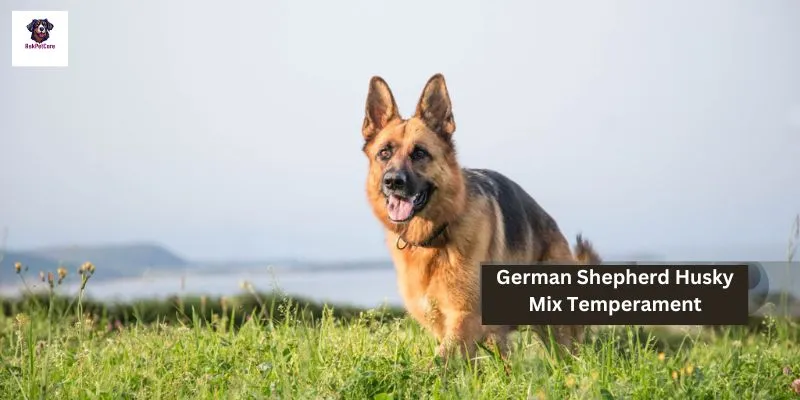
Here’s a simple table with the ten personality traits of German Shepherd Husky mixes along with short descriptions:
| Trait | Description |
| Intelligence and Trainability | Smart dogs that can learn commands and tricks quickly, but may exhibit stubbornness requiring patient and consistent training. |
| Loyalty and Bonding | Form strong bonds with their owners, are affectionate, and protective, making them great family pets. |
| Energy Levels and Exercise Needs | High-energy dogs require plenty of exercise to stay happy and healthy, enjoying activities like running, hiking, and playing fetch. |
| Socialization and Behavior with Strangers | May be cautious around strangers, but can learn to be more comfortable with proper socialization and exposure to different people and situations. |
| Instincts for Work or Play | A natural inclination towards certain activities or tasks, such as participating in canine sports, obedience training, or playing games with their owners. |
| Independence and Stubbornness | Can exhibit independence and stubbornness, requiring patience and consistent training to overcome and establish a strong bond with their owners. |
| Vocalization and Communication | Expressive dogs communicate their needs, feelings, or excitement through vocalizations such as howls, barks, and other sounds. |
| Adaptability to Climate | Varying degrees of tolerance to different climates, with the potential for thriving in colder environments and needing extra care in hotter climates. |
| Prey Drive and Animal Compatibility | Strong prey drive might lead to chasing smaller animals, necessitating precautions to ensure the safety of other pets or animals in the household. |
| Affection and Family Dynamics | Deeply affectionate towards family members, including children and other pets, and thrive on companionship, making them excellent family companions. |
Now understands Managing and Training:
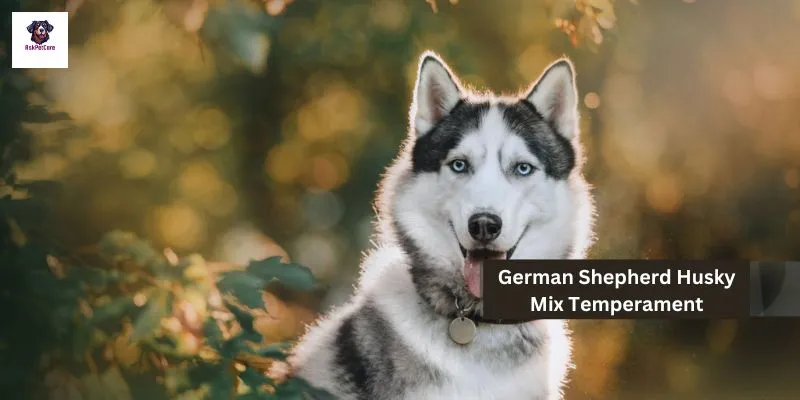
- Importance of early socialization: Early socialization means introducing your German Shepherd Husky mix to different people, animals, and environments when they’re still young. This helps them become comfortable and confident in various situations as they grow up. It teaches them how to behave properly around others and reduces the chances of them being fearful or aggressive later on. So, taking your puppy to new places, meeting different people, and exposing them to other pets early on is really important.
- Positive reinforcement training techniques: Positive reinforcement means rewarding your dog for doing something good instead of punishing them for doing something bad. This could be giving them treats, praise, or toys when they listen to a command or behave well. German Shepherd Husky mixes respond well to positive reinforcement because they like to please their owners. It helps build a strong bond between you and your dog and makes training more enjoyable for both of you.
- Mental stimulation and engagement: These dogs are really smart, so they need mental stimulation to keep them happy and prevent boredom. This could include playing games, teaching them new tricks, or giving them puzzle toys to figure out. Mental exercise is just as important as physical exercise for German Shepherd Husky mixes, so make sure to keep their brains busy with fun and challenging activities.
- Addressing potential behavioral challenges: Like any dog, German Shepherd Husky mixes can sometimes develop behavioral issues like barking, digging, or jumping. It’s important to address these challenges early on before they become habits. This might involve redirecting their behavior, providing more exercise and mental stimulation, or seeking help from a professional trainer if needed. Consistency and patience are key when addressing behavioral challenges, and with time and effort, most issues can be resolved successfully.
- Consistency in Training: German Shepherd Husky mixes respond well to consistent training methods. This means using the same commands, cues, and rules consistently to avoid confusion. They thrive in environments where expectations are clear and predictable. By maintaining consistency in training, owners can help their dogs understand what is expected of them and reinforce desired behaviors effectively.
- Building Trust and Communication: Trust is an essential foundation in the relationship between owners and their German Shepherd Husky mixes. Building trust involves establishing clear communication and understanding between the dog and its owner. This includes being patient, empathetic, and attentive to the dog’s needs and emotions. By fostering a trusting relationship, owners can enhance their dog’s willingness to learn and cooperate during training sessions.
- Patience and Perseverance: Training and managing a German Shepherd Husky mix requires patience and perseverance. These dogs are intelligent but can also be independent and stubborn at times. Owners need to remain patient and consistent in their training efforts, even when faced with challenges or setbacks. With patience and perseverance, owners can overcome obstacles and help their dogs reach their full potential.
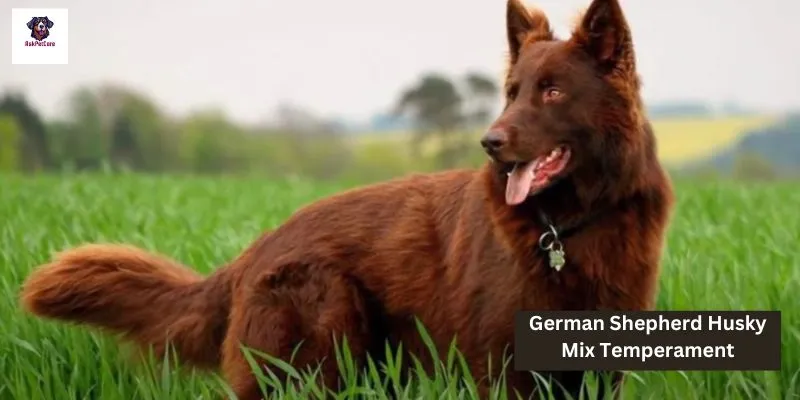
Here’s a table summarizing the points about managing and training German Shepherd Husky mixes:
| Topic | Description |
| Importance of early socialization | Introducing the dog to various people, animals, and environments at a young age to help them become well-adjusted and confident adults. |
| Positive reinforcement training techniques | Rewarding good behavior with treats, praise, or toys to encourage desired actions and build a strong bond between the owner and the dog. |
| Mental stimulation and engagement | Providing activities and toys that challenge the dog mentally, such as puzzle toys or obedience training, to prevent boredom and keep their minds active. |
| Addressing potential behavioral challenges | Identifying and addressing any undesirable behaviors early on through consistent training, redirection, and seeking professional help if needed. |
| Consistency in Training | Using the same commands, cues, and rules consistently to avoid confusion and reinforce desired behaviors effectively. |
| Building Trust and Communication | Establishing clear communication and understanding between the dog and its owner to foster trust and cooperation during training sessions. |
| Patience and Perseverance | Remaining patient and consistent in training efforts, even in the face of challenges or setbacks, to help the dog reach its full potential. |
| Providing a Structured Environment | Creating a predictable and structured environment for the dog with clear rules and routines to help them feel secure and confident. |
| Using Exercise as a Training Tool | Incorporating physical exercise into training sessions to channel the dog’s energy positively and reinforce good behavior through activity. |
| Seeking Professional Guidance | Consult with a professional dog trainer or behaviorist for guidance and support in addressing complex behavioral issues or training challenges. |
Now explore Real-life Stories and Experiences:
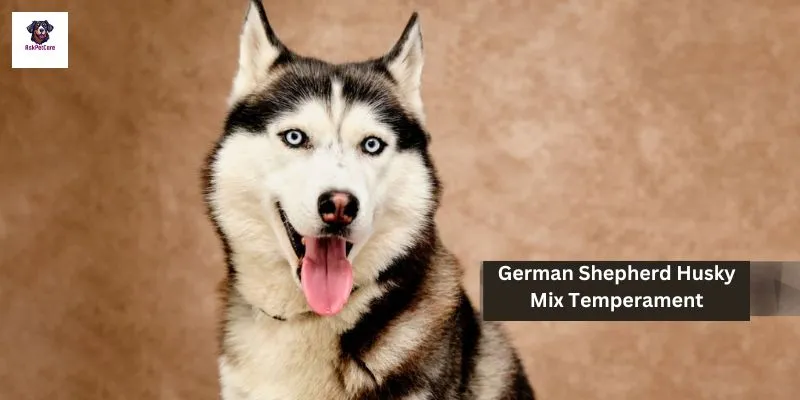
- Testimonials from German Shepherd Husky mix owners:
Here are three testimonials from German Shepherd Husky mix owners:
- “My German Shepherd Husky mix, Max, has been the best addition to our family. He’s incredibly loyal and protective, always keeping a watchful eye over us. His intelligence never ceases to amaze me; he learns new tricks with ease and has even picked up on some helpful behaviors without any formal training. Max has brought so much joy and laughter into our home, and I couldn’t imagine life without him.”
- “Owning a German Shepherd Husky mix like Luna has been both challenging and rewarding. Her boundless energy and adventurous spirit keep us on our toes, but seeing her excitement during our outdoor adventures is truly heartwarming. Luna’s independent streak has taught us patience and persistence in training, but her unwavering loyalty and affection make every effort worthwhile. She’s more than just a pet; she’s a beloved member of our family.”
- “Having a German Shepherd Husky mix like Rocky has been an incredible journey. From his mischievous puppy days to becoming a dependable companion, Rocky has filled our lives with love and laughter. We’ve faced some challenges along the way, especially with his strong prey drive and tendency to wander, but with consistent training and positive reinforcement, we’ve overcome these obstacles together. Rocky’s zest for life and unwavering devotion make every day an adventure worth experiencing.”
- Challenges faced and how they were overcome.
Here are three examples of challenges faced by German Shepherd Husky mix owners and how they were overcome:
- “One of the biggest challenges we faced with our German Shepherd Husky mix, Bella, was her high energy levels and tendency to become restless indoors. To address this, we established a consistent exercise routine that included daily walks, trips to the dog park, and engaging playtime sessions in the backyard. By providing Bella with ample physical activity, we were able to channel her energy positively, reducing her restlessness and promoting calm behavior at home.”
- “Our German Shepherd Husky mix, Max, exhibited some behavioral issues related to separation anxiety when we first adopted him. He would become anxious and vocalize loudly whenever we left the house, which was distressing for both him and us. To help him overcome this, we gradually desensitized Max to our departures by practicing short absences and gradually increasing the duration over time. Additionally, we provided him with comforting items, such as a favorite toy or blanket, to help alleviate his anxiety. Through patience, consistency, and reassurance, Max learned to feel more secure when home alone, and his separation anxiety significantly improved.”
- “Training our German Shepherd Husky mix, Luna presented some challenges due to her strong-willed nature and independent streak. She would sometimes ignore commands or test boundaries, making obedience training a bit of a struggle. To overcome this, we adopted a positive reinforcement approach, using rewards like treats, praise, and playtime to motivate Luna to follow commands and exhibit desired behaviors. Additionally, we ensured training sessions were kept short and engaging, focusing on consistency and repetition to reinforce learning. With patience and perseverance, Luna gradually became more responsive and eager to please, making training sessions more enjoyable for both of us.”
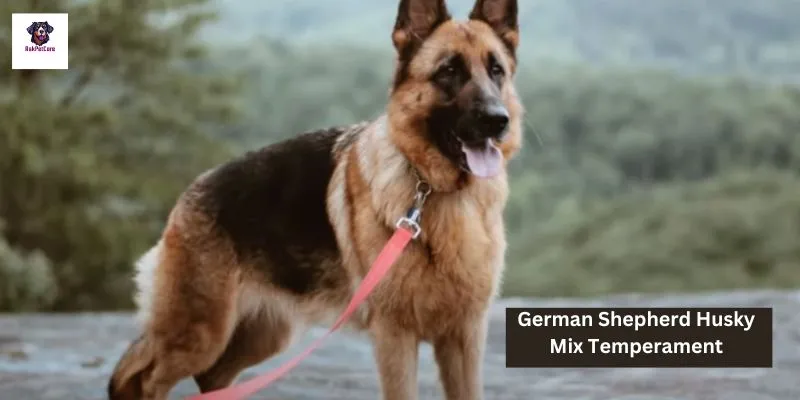
- Insights into the daily life of owning this mix.
Here are three insights into the daily life of owning a German Shepherd Husky mix:
- “Every day with our German Shepherd Husky mix, Rocky is an adventure filled with activity and companionship. Mornings usually start with a brisk walk or jog to help him burn off some of his abundant energy. Throughout the day, Rocky enjoys various mental stimulation activities, such as puzzle toys or training sessions, to keep his sharp mind engaged. In the evenings, we wind down with some quality bonding time, whether it’s cuddling on the couch or playing fetch in the backyard. Rocky’s presence adds excitement and joy to our daily routines, reminding us to appreciate the simple pleasures of life.”
- “Owning a German Shepherd Husky mix like Luna means embracing an active lifestyle that revolves around her needs and preferences. Our days are filled with outdoor adventures, from hiking trails to exploring new parks, where Luna can stretch her legs and satisfy her innate curiosity. Back at home, she enjoys participating in household chores, eagerly assisting with tasks like fetching the mail or carrying groceries. Despite her occasional mischievous antics, Luna’s playful spirit and affectionate nature make every day an enjoyable and fulfilling experience.”
- “The daily life of owning a German Shepherd Husky mix, like Bella, is characterized by a harmonious balance of structure and spontaneity. Our routine includes regular walks, playtime sessions, and training exercises to keep Bella physically and mentally stimulated. However, we also cherish the spontaneous moments of joy and laughter that Bella brings into our lives, whether it’s her goofy antics or unwavering loyalty. As we navigate life’s ups and downs together, Bella remains a steadfast companion, reminding us of the profound bond between humans and their canine companions.”
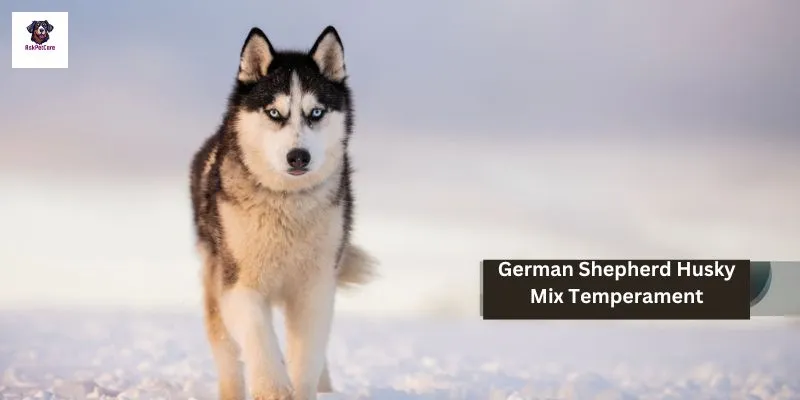
Now Addressing common queries about temperament:
Here are five common queries about the temperament of German Shepherd Husky mixes:
- “Are German Shepherd Husky mixes good with children?”
- Many German Shepherd Husky mixes are known to be great with children, but it depends on their personalities and upbringing. Proper socialization and training from a young age can help ensure they interact well with kids.
- “Do German Shepherd Husky mixes get along with other pets?”
- Similar to their behavior with children, German Shepherd Husky mixes can be good with other pets if they are properly socialized. However, their strong prey drive might make them inclined to chase smaller animals, so early introduction and supervision are essential.
- “How much exercise do German Shepherd Husky mixes need?”
- German Shepherd Husky mixes have high energy levels and require plenty of exercise to stay happy and healthy. Daily walks, runs, or play sessions are essential to help them burn off excess energy and prevent boredom.
- “Are German Shepherd Husky mixes easy to train?”
- German Shepherd Husky mixes are intelligent dogs, but they can also be independent and stubborn. Consistent training with positive reinforcement techniques is crucial for success. With patience and perseverance, they can become obedient and well-behaved companions.
- “Do German Shepherd Husky mixes make good guard dogs?”
- German Shepherd Husky mixes have protective instincts inherited from both parent breeds, making them potentially good guard dogs. However, proper socialization is necessary to ensure they distinguish between friend and foe and don’t become overly aggressive.
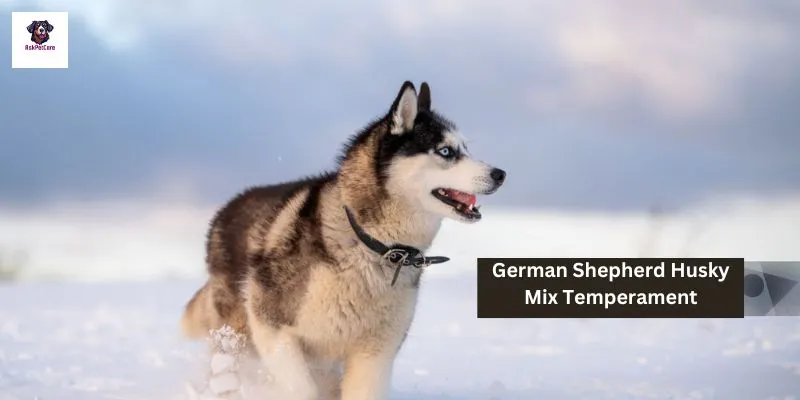
Providing practical advice for potential owners:
Here are five practical pieces of advice for potential owners of German Shepherd Husky mixes:
- Research and choose a reputable breeder or rescue organization:
- Take the time to research and select a breeder or rescue organization with a good reputation for producing healthy and well-socialized German Shepherd Husky mixes. Ask for recommendations, visit the facilities, and inquire about the health and temperament of the dogs before making a decision.
- Prepare your home for a new dog:
- Before bringing a German Shepherd Husky mix home, make sure your living space is safe and suitable for a dog. This includes securing fences in the yard, removing any hazardous items or plants, and setting up a designated area with bedding, food, water, and toys for your new pet.
- Start training and socialization early:
- Begin training and socializing your German Shepherd Husky mix as soon as possible, ideally from puppyhood. Enroll them in puppy classes, expose them to different people, animals, and environments, and teach them basic obedience commands. Positive reinforcement techniques, such as treats and praise, are effective for encouraging good behavior.
- Establish a consistent routine:
- German Shepherd Husky mixes thrive on routine, so establish a consistent schedule for feeding, exercise, training, and rest. This helps them feel secure and reduces anxiety or behavioral issues. Stick to the same daily routine as much as possible to provide structure and stability for your dog.
- Be prepared for the commitment:
- Owning a German Shepherd Husky mix is a long-term commitment that requires time, effort, and resources. Be prepared to dedicate time each day to exercise, training, grooming, and bonding with your dog. Additionally, consider the financial costs associated with veterinary care, food, supplies, and other expenses. Ensure you have the time, energy, and resources to provide a loving and fulfilling life for your furry companion.
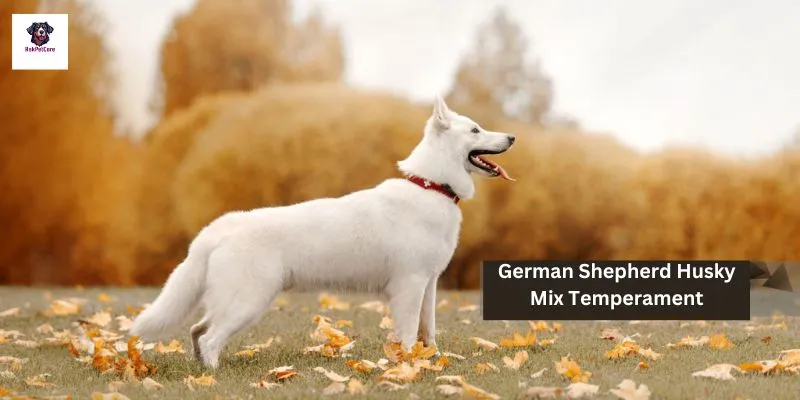
Now explore Dispelling myths and misconceptions:
Here are five myths and misconceptions about German Shepherd Husky mixes that can be dispelled:
- “German Shepherd Husky mixes are aggressive”:
- While German Shepherd Husky mixes may have protective instincts inherited from their parent breeds, they are not inherently aggressive. Like any dog, their behavior largely depends on their upbringing, socialization, and training. With proper care and training, they can be well-behaved and affectionate companions.
- “German Shepherd Husky mixes require excessive grooming”:
- While German Shepherd Husky mixes have thick coats that shed seasonally, they do not necessarily require excessive grooming. Regular brushing to remove loose hair and prevent matting is typically sufficient. Bathing should be done as needed, and other grooming tasks such as nail trimming and ear cleaning should be performed regularly, but they do not require extensive grooming beyond what is typical for most dogs.
- “German Shepherd Husky mixes cannot live in apartments”:
- While German Shepherd Husky mixes are energetic and require plenty of exercise, they can adapt to apartment living with proper care and attention to their needs. Regular exercise, mental stimulation, and opportunities for outdoor activities are essential for their well-being, but with the right environment and routine, they can thrive in apartment living.
- “German Shepherd Husky mixes are difficult to train”:
- While German Shepherd Husky mixes can be independent and stubborn at times, they are intelligent dogs that respond well to positive reinforcement training techniques. Consistency, patience, and proper motivation are key to successfully training them. With patience and perseverance, they can learn obedience commands and other behaviors effectively.
- “German Shepherd Husky mixes are not good with children”:
German Shepherd Husky mixes can be excellent family pets and are often good with children when properly socialized and trained. They are known for their loyalty and protective instincts, which can make them loving and devoted companions for children. Supervision and teaching children how to interact safely with dogs are important factors in ensuring a positive relationship between the dog and children.
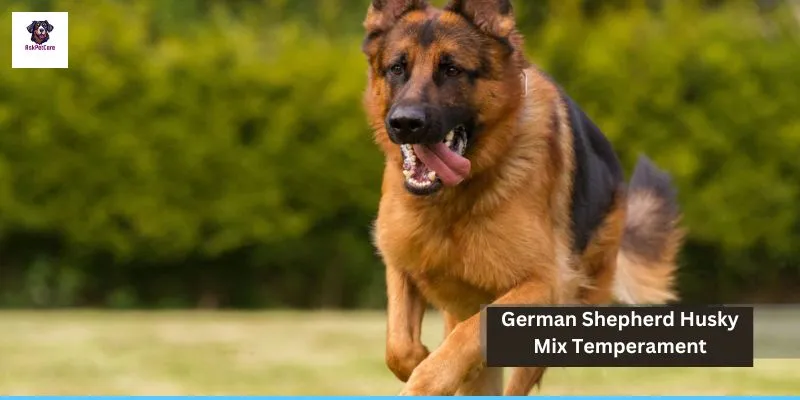
Now understands German shepherd husky mix temperament with other dogs.
let’s break down the temperament of German Shepherd Husky mixes when interacting with other dogs in simple terms:
German Shepherd Husky mixes can have varying temperaments when it comes to interacting with other dogs. Some may be friendly and sociable, while others may be more reserved or cautious.
Socialization: Early socialization plays a crucial role in shaping how a German Shepherd Husky mix behaves around other dogs. If they are introduced to other dogs from a young age in a positive and controlled manner, they are more likely to be friendly and comfortable around them as adults.
Prey Drive: Both German Shepherds and Huskies have strong prey drives due to their backgrounds in herding and hunting. This instinct might influence how a German Shepherd Husky mix interacts with smaller dogs or animals. They may be inclined to chase or exhibit predatory behavior, especially if they have not been socialized properly.
Dominance: German Shepherd Husky mixes can have dominant tendencies, particularly when interacting with dogs of the same sex or those they perceive as a threat to their territory or resources. It’s important for owners to establish themselves as the pack leader and to supervise interactions between their dogs and others to prevent conflicts.
Pack Mentality: Like their parent breeds, German Shepherd Husky mixes have a strong sense of loyalty and may view other dogs as part of their pack. This can lead to positive interactions and the formation of close bonds with other dogs, especially if they are raised together or have compatible personalities.
Training and Social Skills: Training plays a significant role in how a German Shepherd Husky mix interacts with other dogs. Positive reinforcement training techniques can help teach them appropriate social skills and manners, such as how to greet other dogs politely and how to respond to cues from their owners during interactions.
Overall, the temperament of a German Shepherd Husky mix towards other dogs can vary depending on factors such as socialization, individual personality, and training. With proper socialization, training, and supervision, they can develop positive relationships with other dogs and enjoy fulfilling social interactions.
Now explore the German shepherd husky mix temperament protective.
Let’s discuss the protective temperament of German Shepherd Husky mixes in simple terms:
German Shepherd Husky mixes are known to have a protective temperament, which means they are naturally inclined to watch over and defend their family and territory. Here’s a closer look at their protective instincts:
Loyalty: German Shepherd Husky mixes are incredibly loyal to their owners and families. They form strong bonds and will often feel a strong sense of duty to protect them from perceived threats. This loyalty makes them dependable companions who will stand by their loved ones through thick and thin.
Alertness: These mixes are naturally alert and attentive, always keeping a watchful eye on their surroundings. They have keen senses and can quickly pick up on changes in their environment, whether it’s a stranger approaching the house or a new sound in the neighborhood. This heightened awareness allows them to spring into action if they sense any potential danger.
Territorial Instincts: German Shepherd Husky mixes have a strong territorial instinct, which means they may become protective of their home and property. They see their territory as their domain and will often bark or act defensively if they perceive any intruders or threats to their territory.
Fearlessness: These mixes are known for their courage and bravery. They won’t hesitate to step in and confront any perceived threats to their family or territory, even if it means putting themselves in harm’s way. This fearlessness, coupled with their loyalty, makes them effective protectors.
Training Influence: Proper training and socialization play a crucial role in shaping how a German Shepherd Husky mix expresses their protective instincts. Through positive reinforcement training, owners can teach their dog to differentiate between real threats and everyday situations, helping them become well-rounded and balanced protectors.
Overall, the protective temperament of German Shepherd Husky mixes is a valuable trait that can provide a sense of security and peace of mind to their owners. With their loyalty, alertness, territorial instincts, fearlessness, and proper training, they make excellent guardians and devoted companions.
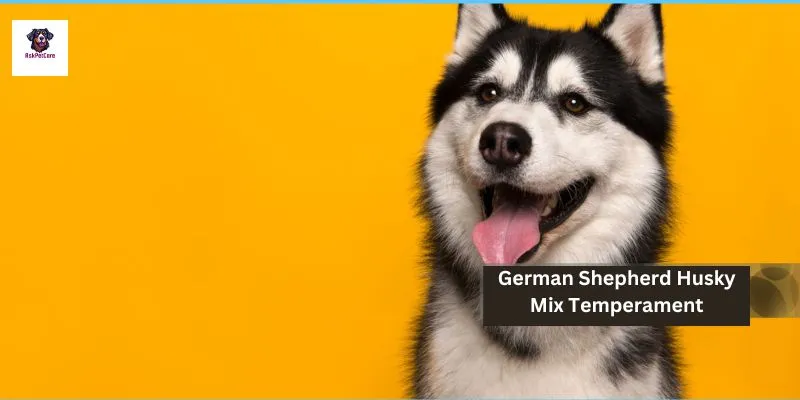
Now understand the full-grown German shepherd husky mix.
Certainly! Let’s talk about what a full-grown German Shepherd Husky mix looks like and what you can expect from them in simple terms:
A full-grown German Shepherd Husky mix is a beautiful and impressive dog that combines traits from both the German Shepherd and Siberian Husky breeds. Here’s what you need to know:
Size: German Shepherd Husky mixes are typically medium to large-sized dogs. On average, they stand between 20 to 25 inches tall at the shoulder and weigh anywhere from 45 to 80 pounds, depending on factors such as genetics and gender.
Appearance: These mixes often inherit a blend of physical characteristics from both parent breeds. They usually have a sturdy build with a strong and muscular body. Their coat is typically dense and medium to long, with a thick undercoat to keep them warm in cold weather. Coat colors can vary and may include combinations of black, tan, gray, and white.
Face: German Shepherd Husky mixes typically have a broad head with erect ears that resemble those of a German Shepherd. Their eyes are usually almond-shaped and can be brown, blue, or a combination of both, reflecting the Husky influence. They often have a striking and alert expression.
Temperament: These mixes are known for their intelligence, loyalty, and protective instincts. They are often affectionate and devoted to their families, forming strong bonds with their owners. German Shepherd Husky mixes are also energetic and playful, requiring plenty of exercise and mental stimulation to keep them happy and healthy.
Exercise Needs: Due to their high energy levels, German Shepherd Husky mixes need regular exercise to burn off excess energy and prevent boredom. Daily walks, runs, or play sessions are essential to keep them physically and mentally stimulated. Without enough exercise, they may become restless and exhibit destructive behaviors.
Training: Training is important for German Shepherd Husky mixes to ensure they are well-behaved and obedient companions. They are intelligent dogs that respond well to positive reinforcement training techniques. Consistency, patience, and firm leadership are key to successfully training these mixes.
Grooming: German Shepherd Husky mixes have a double coat that sheds moderately year-round and heavily during seasonal changes. Regular brushing is necessary to remove loose hair and prevent matting. They may also require occasional baths and nail trims, as well as regular dental care and ear cleaning.
Overall, a full-grown German Shepherd Husky mix is a magnificent and loyal companion that thrives in an active and loving home environment. With proper care, training, and attention to their needs, they can make wonderful pets for families and individuals alike.
Socialization: Full-grown German Shepherd Husky mixes benefit from early and ongoing socialization with people and other animals. Proper socialization helps them develop good manners and confidence when interacting with unfamiliar situations, reducing the likelihood of fearfulness or aggression.
Health Considerations: Like all breeds, German Shepherd Husky mixes are prone to certain health issues, including hip dysplasia, elbow dysplasia, and eye problems. Regular veterinary check-ups, a balanced diet, and maintaining a healthy weight can help mitigate these risks and ensure a long and healthy life for your dog.
Family Compatibility: German Shepherd Husky mixes are known for their affectionate and protective nature, making them great family pets. However, they may be better suited for families with older children due to their large size and energetic play style. Supervision is important when they are around young children to prevent accidental knocks or rough play.
Overall, a full-grown German Shepherd Husky mix is a stunning and intelligent dog that thrives on companionship, activity, and positive reinforcement. By understanding their needs and providing them with love, care, and training, they can become cherished members of the family for many years to come.
Here’s the information presented in a simple table format:
| Aspect | Description |
| Size | Medium to large-sized dogs, typically standing between 20 to 25 inches tall at the shoulder and weighing anywhere from 45 to 80 pounds. |
| Appearance | Sturdy build with a strong and muscular body. Dense, medium to long coat with a thick undercoat, often displaying combinations of black, tan, gray, and white colors. Broadhead, erect ears, and almond-shaped eyes, usually in brown, blue, or a combination of both. |
| Temperament | Intelligent, loyal, and protective. Affectionate and devoted to their families, forming strong bonds with their owners. Energetic and playful, requiring plenty of exercise and mental stimulation. |
| Exercise Needs | Require regular exercise to burn off excess energy and prevent boredom. Daily walks, runs, or play sessions are essential for physical and mental stimulation. Without enough exercise, they may become restless and exhibit destructive behaviors. |
| Training | Intelligent and responsive to positive reinforcement training techniques. Consistency, patience, and firm leadership are essential for successful training. |
| Grooming | The double coat sheds moderately year-round and heavily during seasonal changes. Regular brushing, occasional baths, nail trims, dental care, and ear cleaning are necessary for proper grooming. |
| Socialization | Benefit from early and ongoing socialization with people and other animals to develop good manners and confidence. Proper socialization reduces the likelihood of fearfulness or aggression. |
| Health Considerations | Prone to health issues such as hip dysplasia, elbow dysplasia, and eye problems. Regular veterinary check-ups, a balanced diet, and maintaining a healthy weight can help mitigate these risks and ensure a long and healthy life. |
| Family Compatibility | Affectionate and protective, making them great family pets. Suited for families with older children due to their large size and energetic play style. Supervision is important when around young children to prevent accidental knocks or rough play. |
This table provides a concise overview of the key characteristics and considerations for full-grown German Shepherd Husky mixes.
Are Husky German Shepherd mixes good dogs?
Yes, Husky German Shepherd mixes, also known as Shepskies or Gerberian Shepskies, can be wonderful dogs for the right owners. They are known for their intelligence, loyalty, and protective instincts. Shepskies are often affectionate and devoted to their families, forming strong bonds with their owners. They are also energetic and playful, making them great companions for active individuals or families who can provide them with plenty of exercise and mental stimulation.
What issues do Husky German Shepherd mixes have?
Like all breeds, Husky German Shepherd mixes can have certain health and behavioral issues. Some common health issues include hip dysplasia, elbow dysplasia, eye problems, and skin allergies. Additionally, because they are intelligent and energetic dogs, they may become bored or restless without enough physical and mental stimulation, which can lead to destructive behaviors if not addressed. Proper training, socialization, and regular veterinary care can help mitigate these issues.
Are Shepskies good family dogs?
Yes, Shepskies can be good family dogs under the right circumstances. They are typically affectionate and protective of their families, making them loyal companions. However, due to their large size and energetic nature, they may be better suited for families with older children who can handle their exuberance. Proper training and socialization from a young age are important to ensure they develop good manners and get along well with all family members, including children and other pets.
Do German Shepherd Husky mixes get cold?
Yes, German Shepherd Husky mixes can be sensitive to cold weather due to their double coat, which provides insulation against chilly temperatures. However, their tolerance for colds may vary depending on factors such as coat density, overall health, and individual preference. While some Shepskies may enjoy playing in the snow and colder climates, others may require extra protection, such as a dog coat or sweater, when exposed to cold weather for extended periods. Owners need to monitor their Shepskies closely in cold conditions and take appropriate measures to keep them comfortable and warm.
Here are some reference books that are considered authoritative on the topic of dog care, including nail care:
“The Complete Dog Owner’s Manual” by Dr. Bruce Fogle
“The Ultimate Guide to Dog Care: Everything You Need to Know to Keep Your Dog Happy and Healthy” by Amy Marder and Andrew Luescher
